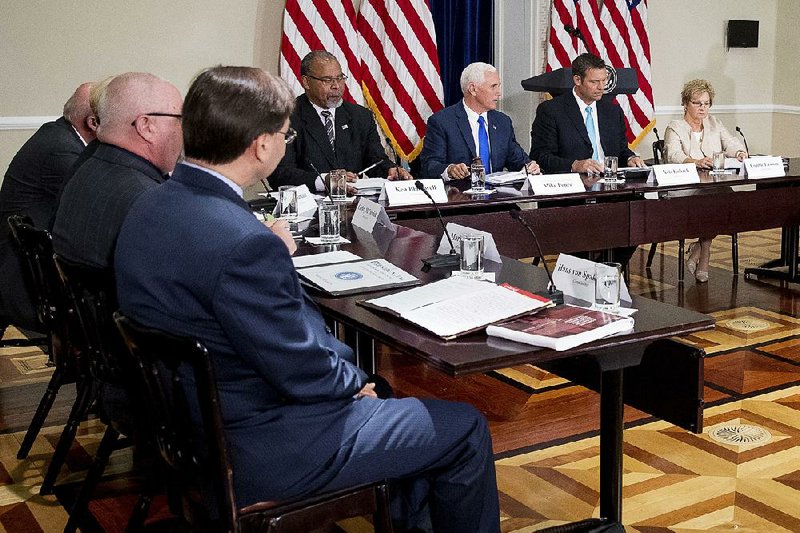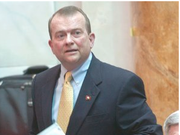WASHINGTON -- President Donald Trump on Wednesday questioned the motives of states that have refused to comply with his voter-fraud commission's request for extensive personal voter information, suggesting they have something to hide.
"One has to wonder what they're worried about," Trump said at the first meeting of the Presidential Advisory Commission on Election Integrity. He said, "There's something, there always is."
The meeting comes during anger at the commission's request to each state for extensive personal voter information, including voter names, voting histories and party affiliations. Aides to Vice President Mike Pence, who serves as the commission's chairman, have said they only asked for information that was already publicly available.
But at least 17 states, plus Washington, D.C., have rebuffed the request, citing privacy concerns and a fear that complying would legitimize the unproven idea that voter fraud is widespread. The requests have also sparked multiple lawsuits.
[PRESIDENT TRUMP: Timeline, appointments, executive orders + guide to actions in first 100 days]
Critics see the commission as part of a conservative campaign to strip members of minority groups and poor people from the voter rolls and to justify unfounded claims made by a president who was angry about losing the popular vote. They also wonder why the White House appears more concerned with unproven allegations of large-scale voter fraud than the intelligence community's conclusion that Russia meddled in the 2016 campaign.
But Trump said the commission would address serious concerns he heard from voters again and again.
"Throughout the campaign and even after, people would come up to me and express concerns about voter inconsistencies and voter irregularities which they saw, in some cases having to do with very large numbers of people in certain states," Trump said, adding, "All public officials have a profound responsibility to protect the integrity of the vote."
In his opening remarks at Wednesday's meeting, David Dunn, a former Arkansas lawmaker and a Democrat, acknowledged that the letter sent to states requesting voter information had raised concerns.
"I hope that this commission will ensure the privacy of America's voting public," he said. "I understand while the letter that was sent to the states asked for only publicly available voter information, it still raised concerns. And I believe that any data, statistics or information collected by us or by the state should be held in our trust and safeguarded from any political misuse."
While other commissioners have contended that there is ongoing election fraud, Dunn said he wants the commission to "look at a myriad of issues to determine whether there are significant problems involving elections and voter integrity."
Arkansas submitted its voting data to the commission July 5, becoming the first state to do so.
The information Arkansas submitted to a federal file exchange did not contain Social Security numbers, felony convictions, military status and driver's license numbers. Such information is not publicly available in Arkansas.
However, names, addresses, dates of birth, political party affiliations, voter history since 2008, registration status, email addresses and phone numbers were shared. The database does not say for whom someone voted -- only whether they voted.
The same Arkansas voter information that was released to the Trump administration has been provided about 200 times since January 2015 to various entities, said Kelly Boyd, the state's chief deputy secretary of state.
'We may never know'
Trump convened the voting commission after claiming on Twitter and in meetings with lawmakers that voter fraud cost him the 2016 popular vote, despite past studies showing voter fraud is exceedingly rare.
"In addition to winning the Electoral College in a landslide, I won the popular vote if you deduct the millions of people who voted illegally," he tweeted in November, several weeks after his electoral victory.
He also alleged at the time, without evidence, that there had been "serious voter fraud" in California, New Hampshire and Virginia and complained that the media wasn't covering it.
Trump continued to make the claim after his inauguration, telling a group of bipartisan congressional leaders days after he took office that he would have won the popular vote if 3 million to 5 million immigrants living in the country illegally hadn't voted.
While there have been isolated cases of people voting illegally, there has been no evidence of widespread voter fraud that would have affected the election results. Trump won the Electoral College by a comfortable margin, but 2016 rival Hillary Clinton won the popular vote by nearly 2.9 million votes.
Kris Kobach, the vice chairman of the voting commission, said in an interview with MSNBC that "we may never know" whether Clinton really won the popular vote.
"We will probably never know the answer to that question, because even if you could prove that a certain number of votes were cast by ineligible voters, for example, you wouldn't know how they voted," said Kobach, who is also Kansas' secretary of state.
Sarah Huckabee Sanders, a spokesman for Trump, rebuffed questions about whether voting irregularities would undermine the legitimacy of Trump's victory in the Electoral College.
"It is clear who the president is based on the fact of who is sitting in the Oval Office," Sanders said.
The commission will also examine ways to protect voting systems from foreign interference, according to Pence aides. U.S. intelligence agencies have concluded that the Russian government mounted a campaign to help elect Trump, hacking the Democratic National Committee and a Clinton campaign aide's emails and spreading propaganda through fake news stories and social media bots.
But Trump has repeatedly undermined their findings by voicing skepticism about Russia's role.
Trevor Potter, the president of the Campaign Legal Center and a former Republican chairman of the Federal Election Commission, accused the bipartisan commission of being "based on false charges of voter fraud that have already been repeatedly disproven."
"Our elections face serious concerns including attempted foreign cyber intrusions, partisan-motivated voter suppression, and the desperate need for modernization of our election administration and voting technology," he said.
"Rather than address these pressing issues in a bipartisan manner, this presidential commission already seems to be blindly focused on manufacturing evidence to support its own foregone conclusions to further partisan objectives."
Pence stressed as he opened the meeting that the panel was "nonpartisan" and that it would be providing a service to all Americans.
"This commission had no preconceived notions or preordained results," he said. "We're fact-finders."
Wednesday's meeting was largely organizational, with the discussion focusing on introductions, outlining the group's mission, and how it will proceed moving forward.
Information for this article was contributed by Jill Colvin of The Associated Press; by Andrew Harris and Shannon Pettypiece of Bloomberg News; and by Brian Fanney of the Arkansas Democrat-Gazette.
A Section on 07/20/2017

